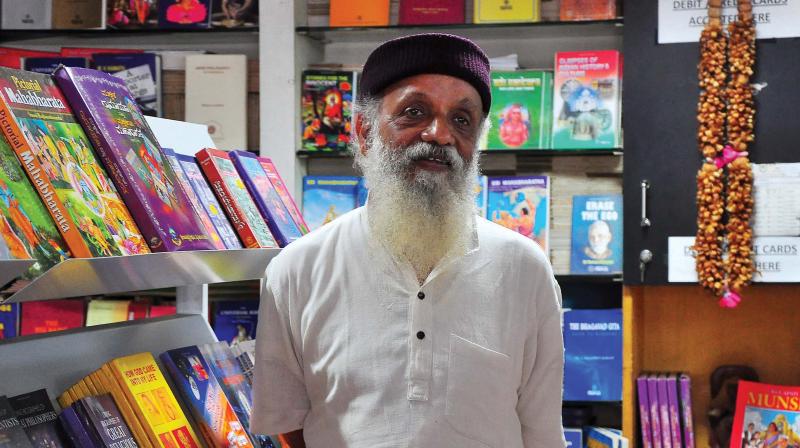Much ado about tolerance: To Prasanna, art is the harbinger of peace

Prasanna’s tryst with politics began in 1975 after he graduated from prestigious National School of Drama, Delhi. Having found his voice in theatre, he went on to start Samudaya reaching out to people in Karnataka and Hyderabad. The youth and disgruntled intellectuals flocked to his side: Theatre gave them space for dissent and expression during the Emergency. “The intolerance we see today is much worse,” he adds, tellingly. Prasanna remains unmoved in the face of intolerance and oppression. “I am already 68, what can they do?” he tells Aksheev Thakur
Prasanna’s flowing beard and white kurta set him apart from the crowd, always. It’s a busy day at Bhartiya Vidya Bhavan and the 69-year-old thespian is hard at work. He approaches people with total humility, his simplicity and obvious passion are hard to resist. Several people oblige: his request for a contribution: Whether or not they know that the man in frayed white kurta is widely regarded as the pioneer of theatre in South India and an IIT graduate – is hard to say. Either way, Prasanna doesn’t bear the slightest trace of conceit.
“Simplicity is key,” he smiles. “I don’t need to have my name heard by a million people and my life doesn’t need to be fed by an ambition for wealth. Over the last week, Prasanna has been spotted at traffic signals and public gatherings, bowl outstretched, collecting funds for a literary meet. People oblige, they gather atleast that this is no ordinary event. With Prasanna involved it usually isn’t. “Literature is a harbinger of peace,” he says. It is in keeping with this that the Dakshinayana and Gram Seva Sangh are organising a tolerance meet for writers across the state. It happened 40 years ago too, he says, as the Protect Literary Meet. “This event, however, will be historic. Litterateurs will return to their homes and teach their communities about religious tolerance. A Hindu will teach his Hindu brothers, a Muslim his Muslim brothers and so on.”
He was in his twenties, studying at an IIT when he realised his love for theatre. Inspired by the great thespian, B.V. Karanth, he joined the National School of Drama, graduating in 1975. “Some of the best people in the world are dropouts,” he chuckled. “Money was never a concern for me. My needs have always been minimal.”
He returned to Bengaluru that year and founded Samudaya, one of the largest radical theatre movements for workers in South India. In 1972, the Jana Natya Manch, founded by the slain theatre-artist Safdar Hashmi, set the stage, so to speak, for experimentalist and radical theatre. Here, art came laced with heavy political and social undertones. The movement, which was based in Delhi, soon became a cultural group for leftist parties. Samudaya, on the other hand, hand its roots in the backward regions of Karnataka and Hyderabad.
It so happened that Samudaya was founded when the Emergency imposed by former Prime Minister Indira Gandhi was the focus of all worry and debate, when large groups of intellectuals had begun to express their frustration. “Here, I used theatre to register my protest,” he says. Samudaya inspired the young.” It wasn’t something he had planned. The use of theatre to expose the fallacies of the political classes had never been part of the plan, neither had it occurred to him during his early days of college. His arrival at the National School of Drama, however, changed all that. “Those were glorious days,” he recalls. The celebrated actor Irrfan was Prasanna’s student, while veteran actors Om Puri and Raj Babbar were his classmates.
Cinema has adopted the activists’ mantle also, with legends like Shyan Benegal and Govind Nihalani, making films with political connotations. “Theatre needs inspiration and money,” he argues. “Filmmaking needs to be fed with money.” He agrees, however, that the adaptation of plays by Vijay Tendulkar into cinema was revolutionary. “Today, ideas need to be commercially viable.” He’s a Gandhian through and through, perhaps this is most evident in his struggle to protect the craftsmen of India. His relentless struggle for zero percent taxation on handicrafts finally saw the light of day in April this year, when the union government brought handicraft products under the zero percent tax rate. “Tax on industries,” he says, “Should be punitive. The government can levy huge taxes on machine made goods, for they have also destroyed the environment. Handicrafts, on the other hand, are eco-friendly and sustainable.”
Today, with religious intolerance gripping the nation and lynching becoming something of a vigilante justice norm, the painting of intellectuals as anti-nationals for being critical of the government disappoints the activist who says, “Today the situation is worse than emergency.”
Did the arrest of activists earlier this week frighten him? “No. I’m 68. How much longer will I live? I will continue to fight to my last breath and I’m not scared of a government that works for the Ambanis and the Adanis,” he declares heatedly.
There is a silver lining in all this. Prasanna is unshakeable in his belief that theatre is in the midst of a second-coming. “We will see those days of fearlessness once more, the days of Safdar Hashmi,” he says. “Youngsters today have it in them. They’re more upfront and intrepid than even Hashmi.”

